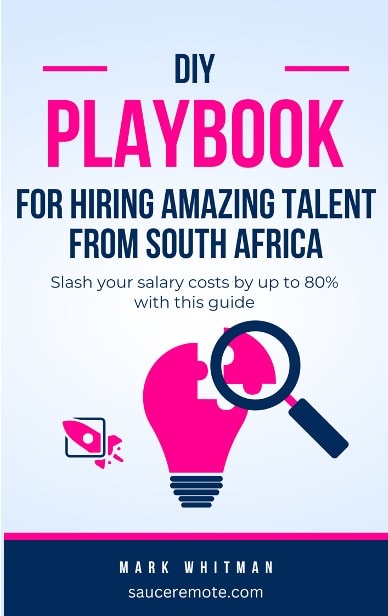What does EOR Stand for?
EOR stands for "Employer of Record."
This term is becoming more common as companies expand globally and realise the benefits of hiring remote workers.
Let me explain what an EOR is, why you should work with one and how to choose the right EOR for your business.
Ready? Let’s roll.

Discover how to slash your salary costs by 80%
Get our exact process for hiring amazing overseas talent from South Africa. Includes copy-and-paste templates and a detailed salary guide.
What Does EOR Stand For?
As I’ve mentioned, EOR stands for "Employer of Record."
Now, let’s break down where this term comes from.
The concept of an Employer of Record has its roots in the growing need for businesses to manage employees across borders without setting up a full legal entity in every country.
Essentially, it means that a third-party organisation takes on the legal responsibilities of employment on behalf of your company.
They’re handling the paperwork, payroll, and legal compliance, so you don’t have to.
But here's where it can get confusing. Some people mix up an EOR with a staffing agency or a Professional Employer Organisation (PEO).
They’re not the same.
An EOR directly employs the workers on paper, but you still manage their day-to-day tasks and responsibilities.
A PEO, on the other hand, shares employment responsibilities with your company, which is a whole different ball game.
Pro tip: How do you know if you need a PEO or EOR? Simple. Check out my guide on PEO vs EOR. You’ll quickly see which model works best for your business.
So, when we talk about an EOR, think of them as the official employer in the eyes of the law, but you’re still in charge of the work.
Now, let's move and find out what an EOR does.
Hire remote talent from South Africa & slash salary costs by 80%
Salaries start from £8,000 per year!
What Does an EOR Do?
An Employer of Record (EOR) takes on the heavy lifting of managing employment's legal and administrative side. Here’s a quick breakdown:
Payroll and Taxes:
An EOR handles the nitty-gritty of payroll, making sure employees get paid on time while also dealing with tax deductions and benefits.
They ensure everything complies with local tax laws, so you don’t have to worry about getting it wrong.
Legal Employment:
When you use an EOR, they become the legal employer in the countries where your employees are based. This means they’re responsible for things like contracts, work permits, and other legal requirements.
Compliance Management:
Different countries have different labour laws, and keeping up with them can be a headache.
An EOR stays on top of these laws, ensuring your business follows all local regulations, from worker protections to termination procedures.
In short, an EOR allows companies to hire and manage employees across borders without being bogged down by legal and administrative complexities.
Let’s take a closer look at why so many companies decide to work with an EOR.
Hire remote talent from South Africa & slash salary costs by 80%
Salaries start from £8,000 per year!
Why Work with an EOR?
Thinking about expanding your business globally? An Employer of Record (EOR) can make that process a whole lot smoother. Let me explain.
Global Expansion:
Hiring internationally usually means jumping through a ton of hoops—like setting up local entities in each country.
With an EOR, you can skip all that.
Your chosen EOR, like Sauce, handles the legal setup so you can focus on making money.
Cost Efficiency:
Setting up shop in a new country isn’t cheap. Trust me. I know. Between legal fees, office space, and local expertise, the costs can add up fast.
An EOR helps you cut those costs by acting as your in-country legal employer, letting you avoid the hefty expenses of establishing a subsidiary.
Risk Mitigation:
Every country has its own set of labour laws and regulations. Messing up even a small detail can lead to fines or legal troubles.
An EOR knows the ins and outs of these laws, helping you stay compliant and reducing the risks of operating in unfamiliar territories.
Flexibility and Speed:
Markets change, and sometimes, you need to scale your workforce up or down quickly. An EOR gives you that flexibility.
Whether you’re testing a new market or responding to business needs, an EOR lets you adjust your team size without long-term commitments or red tape.
Next, let me share some common use cases for EORs. You’ll quickly see why an EOR is better than sliced bread.
Hire remote talent from South Africa & slash salary costs by 80%
Salaries start from £8,000 per year!
Common Use Cases for EORs
An Employer of Record (EOR) isn’t just for big corporations with massive global ambitions. It’s a versatile tool that can fit into all sorts of business scenarios.
Let’s look at some real-world examples where an EOR shines.
Remote Work:
Imagine this—you’ve found the perfect candidate for your team, but they’re halfway across the world. With an EOR, that’s no problem.
They can officially hire your remote worker in their home country, handle the local payroll and taxes, and make sure everything’s above board.
So, you can build your dream team from anywhere without the hassle of international employment laws.
Short-Term Projects:
Got a project that needs specialised skills for just a few months? An EOR is your go-to.
They can quickly bring on the right talent without locking you into long-term commitments.
Once the project wraps up, the EOR handles the end-of-contract details, so you don’t have to worry about it. It’s like having a temporary workforce on demand.
Testing New Markets:
Thinking about expanding into a new country but not ready to commit fully? An EOR lets you dip your toes into new markets without the heavy upfront investment.
You can hire locally, see how things go, and if it works out, you can scale up. If not, you haven’t sunk a ton of money into setting up a full operation.
An EOR gives you the flexibility to adapt to whatever your business needs—building a global remote team, tackling a short-term project, or exploring new markets with minimal risk.
All of this sounds fantastic, right? So, how do you go about choosing the right EOR? Let me explain.
Hire remote talent from South Africa & slash salary costs by 80%
Salaries start from £8,000 per year!
How to Choose the Right EOR
Choosing the right Employer of Record (EOR) is a big decision. It’s about finding a partner that can meet your specific needs and help you grow your business smoothly.
Luckily, finding the best EOR companies isn’t that tricky. All you have to do is look at the following.
Key Considerations:
First off, look at the EOR’s expertise in the regions where you want to operate.
Do they have a solid understanding of local laws and regulations? Sauce, for instance, specialises in the South African market. This market is excellent for UK and US markets.
Next, think about their service offerings—are they covering everything you need, from payroll to compliance?
Finally, reputation matters. Look for testimonials, case studies, or client reviews that speak to the EOR’s reliability and performance.
But you’ve got more homework.
Vendor Comparison:
When comparing EOR services, it’s important to go beyond just the basics.
Look at the pricing structure—are they transparent about costs?
For example, Sauce charges only £350 monthly, making it a cost-effective option without sacrificing quality.
Also, consider the level of customer support they provide. You want an EOR that’s responsive and available when you need them, not one that leaves you hanging.
And finally, there are some essential questions to ask before hiring an EOR.
Questions to Ask:
Before you sign on with an EOR, you should ask a few key questions, like:
- What’s their process for ensuring compliance with local labour laws?
- How do they handle payroll in different currencies?
- What’s their track record with clients in similar industries?
- And don’t forget to ask about scalability—can they grow with you as your business expands?
In the end, choosing the right EOR comes down to finding a partner who is affordable, dependable, like Sauce, and aligns with your business goals.
My Final Thoughts
And there you have it. Now you know what EOR stands for. The next question is, are you ready to work with the best EOR company in South Africa? I bet you are. Go on and hire with Sauce. You won’t regret it.
